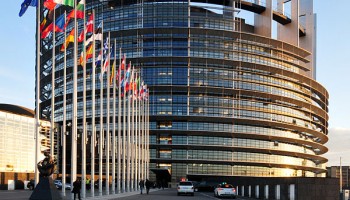Two Bivol journalists, Atanas Tchobanov and Assen Yordanov, were invited to speak by the Council of Europe (CoE) and presented their Balkanleaks platform and the Canadian OpenNet initiative at the "In Search of Transparency" panel. But Bivol says that their journalists did not find transparency at the forum, where their presentation was the only one from the conference not posted on the forum's website. When video was finally made available, Bivol noticed that significant portions were cut.
Initially, CoE maintained that a "technical problem" prevented the video from being available online, but when pressed for particulars, CoE refused to divulge any additional details. Bivol says that the "technical problem" was actually a "political problem."
An audio recording of Claudia Luciani, Director of the Democratic Governance Directorate, confirms that there was indeed no technical problem. So what kept the video from being posted? What was the political problem?
Apparently, CoE did not take kindly to Bivol naming Boyko Borisov, Sergey Stanishev, and Monica Yosifova in an unfavorable light. After the presentation, "several people besieged [Yordanov] in the hallway and loudly attacked the journalist, saying that it was undignified to speak critically about Bulgaria at such a forum."
The Council of Europe sometimes goes by the nickname "Temple of Democracy," but Tchobanov and Yordanovsay that their experience shows CoE unworthy of the moniker. "We think that we were and are subjected to UNACCEPTABLE CENSORSHIP," they said in a statement, "and we are shocked by the BLUNT LIE about the so called 'technical problem.'"
A poll conducted at the forum revealed that 83 percent of participants believed the initiative Bivol presented "greatly increases the influence of citizens in the process of political decision-making," and "makes democratic institutions more transparent and accountable." Despite this, and the fact that CoE screened the presentation beforehand, the video was heavily edited before it finally found its way online.
Tchobanov and Yordanovsay, already incensed over the "technical problems" apparent lie, were furious with the censorship of the video. Bivol's coverage summed up the feelings, "We admit that we did not expect ... to be blatantly censored at a Forum for Democracy, in a panel dedicated to transparency and the fight against censorship!"
See the edited video below:
{youtube}cELhJxBAc5M{/youtube}






